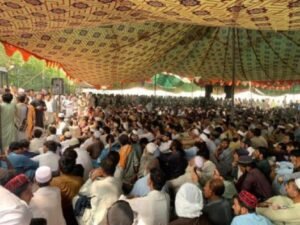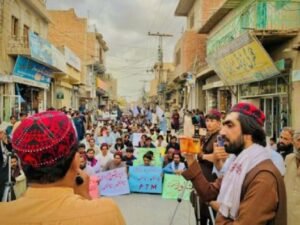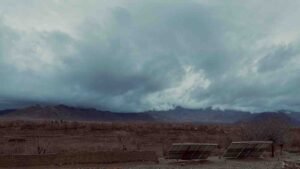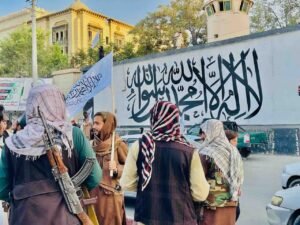Durand Line: A Historical Injustice to Pashtun Identity

Khost Province, bordering Pakistan. Captured by @AADIL for ADN.
By Shinwari
Pakistan’s endeavor to bolster its influence in South Asia through the support of extremist factions has encountered hurdles, particularly with the emergence of the Taliban. In the backdrop of the Soviet–Afghan War, Pakistan wielded influence over the Mujahideen, but navigating the complexities of the Taliban, which attaches strong importance to Pashtun nationalism, poses a formidable challenge.
The Durand Line, a geopolitical boundary delineated by the British in 1893, stands as a poignant testament to historical injustices perpetrated against the Pashtun populace, which is being continued by Pakistan. Its genesis can be traced to the aftermath of the Second Anglo–Afghan War, wherein the British sought to assert control over Afghanistan following the humiliation of the First Anglo–Afghan War’s staggering losses. Designed to partition Pashtun territory between Afghanistan and British India, the Durand Line served to fracture tribal cohesion among Pashtun communities and facilitate British hegemony.
The ramifications of this partition reverberated deeply within the Pashtun community, as families and tribes found themselves arbitrarily divided by artificial boundaries. This fragmentation undermined Pashtun unity and autonomy, eroding the fabric of their social and political identity. Moreover, the unilateral imposition of the Durand Line disregarded Pashtun’s aspirations for self-determination, exacerbating simmering grievances that persist to this day.
Pashtuns residing on both sides of the Durand Line have endured generations of political and socioeconomic marginalization. In Afghanistan, they faced discrimination under successive regimes, while Pashtuns in Pakistan encountered systemic barriers to participation in governance and development initiatives. The Durand Line emerged as a potent symbol of Pashtun subjugation, embodying the forcible partition of their ancestral homeland and the suppression of their collective identity.
The Rise of PTM to Seek Justice
In response to these injustices, movements advocating for Pashtun rights and unity have gained traction. The Pashtun Tahafuz Movement (PTM) in Pakistan, for instance, has emerged as a vocal proponent for the redressal of Pashtun grievances and the recognition of their political agency. By amplifying their demands for justice and equality, these movements have galvanized Pashtun communities on both sides of the border, challenging the status quo and demanding accountability from state actors.
The resurgence of the Taliban, deeply entrenched in Deobandi Islam and Pashtun nationalism, has reignited calls for Pashtun solidarity and the rectification of historical injustices. For the Taliban, the obliteration of the Durand Line and the reunification of Pashtun territory represent foundational goals in their quest for legitimacy and authority. This resurgence underscores the enduring significance of Pashtun identity and the unresolved tensions stemming from colonial-era divisions.
Pakistan views the Durand Line as a legal border recognized internationally. With 90 percent of the fencing completed, Pakistan sees it as a done deal, leaving Afghanistan no choice but to accept it. There are reports that Pakistan has been extending its control westward, moving the border inside Chaman by about a mile and building a new crossing. In Chahar Burjak district, Pakistani forces went 15 kilometers inside Afghanistan to put up fences, a second attempt after facing resistance from the Taliban near Nangarhar province.
Using the Durand Line as a pretext, Pakistan continues to challenge Afghanistan’s sovereignty and territorial integrity. This unilateral border policing has harmed the sense of community among the Pashtuns. For them, their ethnic identity is more significant than any imposed by the state. Living together for generations, they see the line as nothing more than an artificial division. Many Pashtuns still follow their traditional tribal customs, valuing “Pashtunwali” over the state’s ideology. Even before independence, the Pashtun Khudai Khidmatgar movement in the Northwestern Frontier Province opposed partition and advocated for an independent “Pashtunistan,” refusing to merge with Pakistan.
Durand Line Dispute: Challenging Legitimacy and Fostering Regional Reconciliation
After coming to power in August 2021, the Taliban has consistently rejected the Durand Line as a legitimate border and opposed Pakistan’s fencing efforts. During a gathering in Logar on February 15, 2024, marking the 35th anniversary of the Soviet Union’s withdrawal from Afghanistan, Sher Mohammad Abbas Stanikzai, Deputy Foreign Minister of the Taliban, reaffirmed this stance. He emphasized that Afghanistan’s territory extends eastwards beyond the Durand Line. He stated that the requirement of visas and passports to travel “to Afghanistan” is not acceptable for the Afghan people. He reiterated the Taliban’s stance, stating, “We have never recognized Durand and will never recognize it. Today, half of Afghanistan remains separated on the other side of the Durand Line. Durand is a line drawn by the English on the hearts of Afghans. Our neighboring country cruelly deports Afghans and demands they return to Afghanistan, which is unacceptable.”
The Durand Line serves as a stark reminder of the enduring legacy of colonialism and its deleterious impact on Pashtun communities. Its arbitrary imposition by the British Empire and now by Pakistan, devoid of any regard for local aspirations, continues to shape the geopolitical landscape of the region. The struggle for Pashtun rights and recognition underscores the imperative of addressing historical injustices and fostering inclusive governance in South Asia. Only through concerted efforts to acknowledge and rectify past wrongs can a path towards reconciliation and peace be forged in the region.
Author chooses a single pseudonym. Shinwari is a freelance journalist based in Peshawar, Pakistan.
Note: The contents of the article are of sole responsibility of the author. Afghan Diaspora Network will not be responsible for any inaccurate or incorrect statement in the articles.





